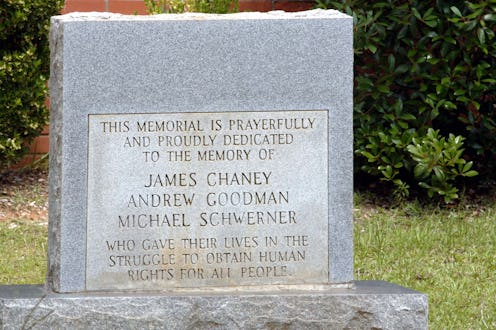News
Why This 1964 Hate Crime Matters In 2016
Considering the massacre at the Pulse nightclub in Orlando this year, the church shooting in Charleston, SC last summer, and countless other hate-based acts of terror committed on American soil, the 21st Century has seen its fair share of hate crimes so far. Attacking the marginalized based on their identities is, unfortunately, as American as apple pie. So why would three race-fueled murders from 52 years ago matter now? In the case of the "Mississippi Burning," which was formally closed by police 52 years to the day on Tuesday, the elapsed time mattered more than you might think.
The murders of three civil rights workers — James Chaney, Andrew Goodman, and Michael Schwerner — in Mississippi during the "Freedom Summer" drive to register black voters in Mississippi in 1964 has a storied (and sordid) history. The incident helped inspire the passage of the 1964 Civil Rights Act, and it was later commemorated on film in 1988's Mississippi Burning , but the case went unprosecuted until it was reopened 40 years later due to public pressure.
Long believed to be the work of a Klu Klux Klan chapter which included a local sheriff, one of the men involved, KKK leader Edgar Ray Killen, was prosecuted in 2005, and is currently serving a 60-year sentence for his role in the conspiracy. Now, prosecutors have decided to close the case again, because no new evidence has been found that would help convict the two remaining living suspects, Jimmy Lee Townsend and James "Pete" Harris.
According to Mississippi Attorney General Jim Hood, the state has "determined that there is no likelihood of any additional convictions. Absent any new information presented to the FBI or my office, this case will be closed.”
Taken on its face, the "Mississippi Burning" murders were atrocious enough. Three young men were killed by a hate group for attempting to help African-Americans exercise their rights. Within the larger context of domestic terrorism and hate crimes, however, it paints a frightening picture that is all too relevant in our current cultural landscape. The state's lack of apology, initial lack of prosecution, and alleged complicity in the murders committed over half a century ago echoes the lack of sympathy — and worse, callous jokes — by public officials in New Orleans following an unprosecuted arson at the UpStairs Lounge, a New Orleans gay club. That fire killed 32 people, a decade to the week after the murders of Chaney, Goodman, and Schwerner. Of course, more current murderous hate crimes have resulted in massive public outcry and official admonishment, which only serves to show how intense the difference is between American public sentiment in the '60s and '70s and our public opinion today.
It's essential to remember our collective American past of bigotry, from the Trail of Tears, to the eugenics movement (supported by some suffragettes) which sterilized an untold number of people against their will, to the growing list of hate crimes against houses of worship, to the MOVE bombings, when Philadelphia police bombed a residential neighborhood in West Philadelphia and killed 11 people in 1985.
There are too many acts of hatred committed by Americans to mention, many of which are historically suppressed or downplayed. That's why when each new act of domestic terror dominates headlines, we must not fall into the trap that leads us to believe each new atrocity is individual. They are part of a long history of oppressive, bigoted violence, and if we are to change the course of our country, we must view them as such.
